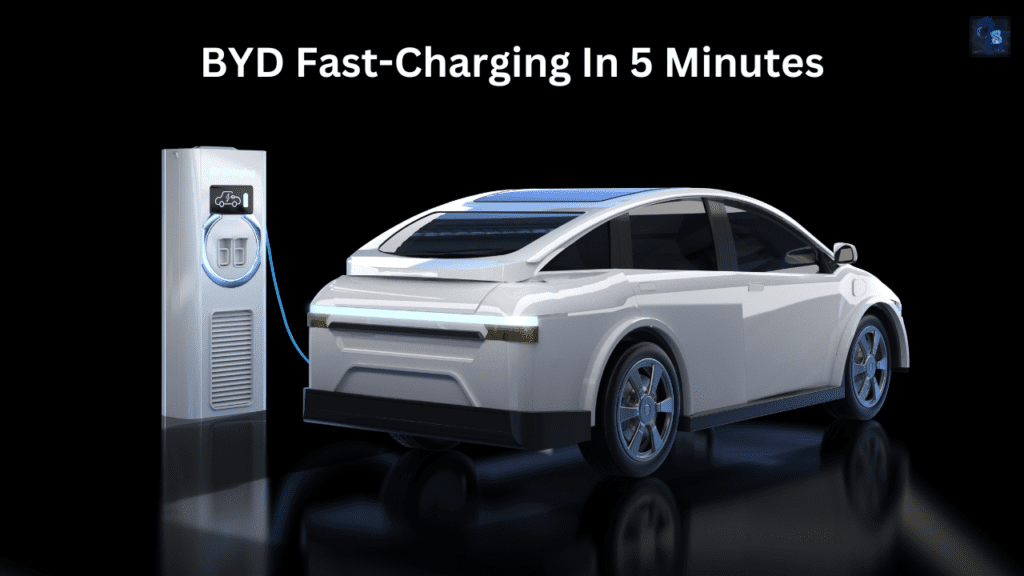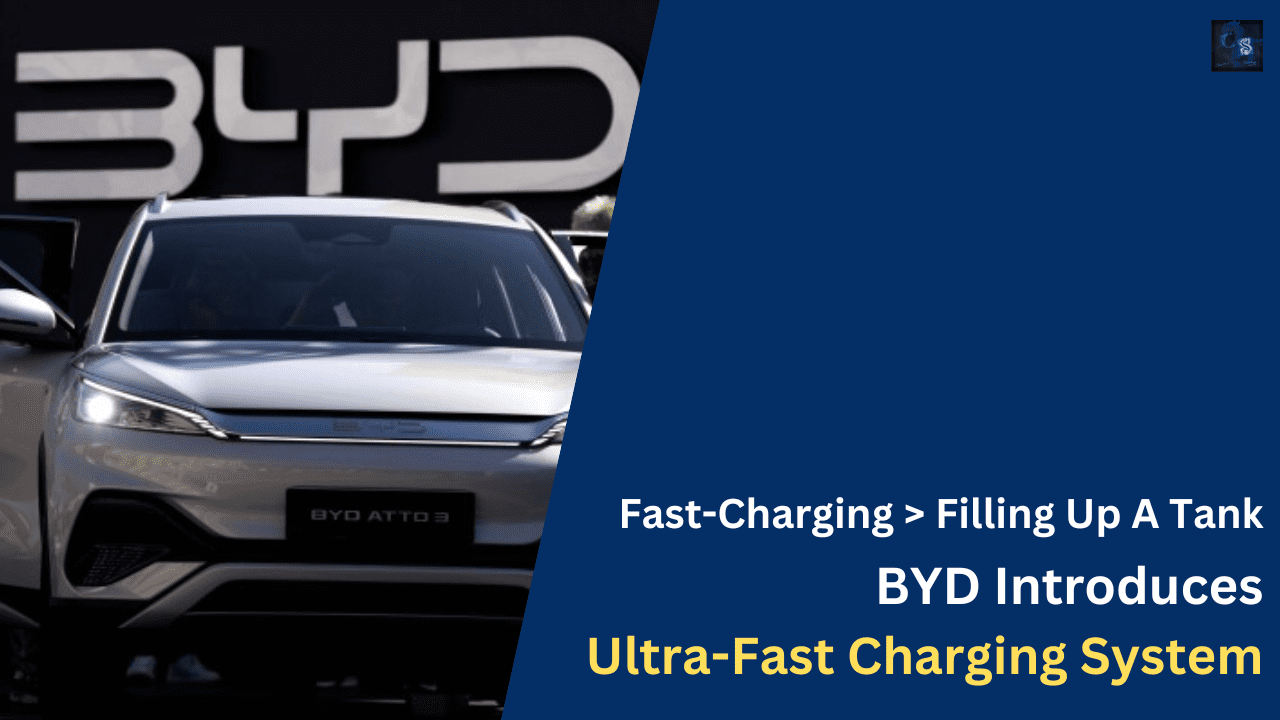Fast-Charging Technology Might Be As Rapid As Filling Up A Tank, According To Chinese EV Manufacturer BYD
Hello guys, welcome back to our blog. In this article, I will discuss fast-charging technology launched by EV manufacturer BYD, and how it impacts the EV market.
Ask questions if you have any electrical, electronics, or computer science doubts. You can also catch me on Instagram – CS Electrical & Electronics
- Automotive Functional Safety (ISO 26262) Vs Safety Of The Intended Functionality (SOTIF – ISO 21448): What’s The Difference?
- Difference Between Typical And Bare-Metal Programming
- The Rise Of AI Chips: How Semiconductors Are Powering The AI Revolution
Fast-Charging Technology Might Be As Rapid As Filling Up A Tank, According To Chinese EV Manufacturer BYD
Chinese electric vehicle (EV) giant BYD has unveiled a groundbreaking charging system that it claims can dramatically reduce charging times, bringing them in line with the time required to refuel a traditional gasoline-powered vehicle. This technological advancement could revolutionize the EV industry by addressing one of the most significant concerns of potential buyers—charging duration.
Following the announcement, BYD’s stock price soared on the Hong Kong Stock Exchange, registering a 4.1% increase on Tuesday. This surge pushed the company’s share value to a record high of 408.80 Hong Kong dollars, reflecting investors’ optimism about BYD’s future. The development strengthens BYD’s already dominant market position and could further solidify its status as one of the leading players in the global EV sector.
During a high-profile event streamed live from BYD’s headquarters in Shenzhen, the company’s founder, Wang Chuanfu, introduced two upcoming vehicle models equipped with the new ultra-fast charging technology. These vehicles—namely the Han L sedan and Tang L SUV—will be capable of absorbing an astonishing peak charging power of 1,000 kilowatts (kW), or 1 megawatt (MW). According to Wang, this level of power will allow the cars to gain enough energy to travel approximately 400 kilometers (249 miles) in just five minutes of charging time. The introduction of this cutting-edge technology positions BYD at the forefront of the EV charging revolution.

BYD, which was the world’s second-largest producer of battery electric vehicles (BEVs) in 2024, has been steadily closing the gap with Tesla. While Tesla retained the top position for purely electric vehicle sales, BYD’s broad product portfolio—including its extensive range of plug-in hybrid electric vehicles (PHEVs)—helped it capture a significant share of the global market. Founded in 1995 as a battery manufacturing company, BYD transitioned into automobile production in 2003 under the leadership of Wang Chuanfu, who is often compared to Tesla’s Elon Musk due to his pioneering efforts in the EV sector.
One of the most striking aspects of BYD’s new charging technology is its speed. Offering a charging rate of 1,000 kW, this system is twice as fast as Tesla’s existing Superchargers, which currently max out at 500 kW. The ability to charge an EV in a matter of minutes could be a game-changer for the industry, significantly improving the convenience of electric vehicle ownership. Faster charging solutions are widely seen as a crucial factor in accelerating EV adoption worldwide, as they address one of the biggest deterrents for consumers hesitant to switch from gasoline-powered cars.
The unveiling of BYD’s advanced charging infrastructure comes at a time when Tesla is facing mounting challenges. The American automaker’s stock price took another hit this week, plunging by 5.5% on Tuesday following a 4.8% decline on Monday. Investors have been growing increasingly concerned about the company’s performance, as its market valuation has plummeted by 44% since the beginning of 2025. Several factors have contributed to Tesla’s struggles, including missed sales targets, increased competition from lower-cost EV manufacturers like BYD, and the ongoing pressure to deliver on autonomous vehicle promises—something CEO Elon Musk has been touting for nearly a decade without tangible results.
Adding to Tesla’s woes, Musk’s close alignment with former U.S. President Donald Trump and his controversial political stances in Europe have further rattled investors. The association has sparked concerns about Tesla’s reputation and its ability to maintain consumer trust amid shifting political dynamics. In contrast, BYD has maintained a strategic focus on product innovation and market expansion, solidifying its position as a formidable Tesla competitor.
Further amplifying its competitive edge, BYD also announced plans to roll out a network of 4,000 high-speed “flash-charging stations” across China. This initiative aims to provide BYD EV owners with a reliable and efficient charging infrastructure, reducing dependency on third-party charging networks. While the company did not disclose the exact timeline or financial investment for this massive undertaking, the announcement signals BYD’s commitment to eliminating “charging anxiety” among EV users.
“In order to fully address our users’ concerns about charging time, we have been pursuing the goal of making electric vehicle charging as fast as refueling a petrol car,” Wang stated during the event. “This marks the first time in the industry that charging power has reached the megawatt level.”
BYD’s latest EV models featuring this ultra-fast charging capability are expected to be competitively priced, with the Han L sedan and Tang L SUV starting at 270,000 yuan ($37,330). These vehicles are poised to disrupt the premium EV market by offering superior charging speeds at an affordable price point.
Tesla has been operating its Supercharger network in China since 2014, but it now faces intensifying competition from a growing number of domestic EV makers investing heavily in charging infrastructure. Chinese companies such as Nio, Li Auto, Xpeng, and Zeekr have been aggressively expanding their networks to enhance convenience for their users. BYD’s decision to enter this space with its own charging stations signals its ambition to establish a more comprehensive EV ecosystem, reducing reliance on third-party networks and enhancing customer loyalty.
As the EV landscape continues to evolve, BYD’s latest innovation represents a significant milestone in making electric vehicles more practical and appealing to a broader audience. With Tesla navigating multiple challenges, including investor skepticism and increasing market competition, BYD’s advancements in ultra-fast charging technology could further shift the balance of power in the global electric vehicle market.
This was about “Fast-charging Technology Might Be As Rapid As Filling Up A Tank, According To Chinese EV Manufacturer BYD“. Thank you for reading.
Also, read:
- 100 (AI) Artificial Intelligence Applications In The Automotive Industry
- 1000+ Automotive Interview Questions With Answers
- 2024 Is About To End, Let’s Recall Electric Vehicles Launched In 2024
- 50 Advanced Level Interview Questions On CAPL Scripting
- 7 Ways EV Batteries Stay Safe From Thermal Runaway
- 8 Reasons Why EVs Can’t Fully Replace ICE Vehicles in India
- A Complete Guide To FlexRay Automotive Protocol
- Adaptive AUTOSAR Vs Classic AUTOSAR: Which One For Future Vehicles?

